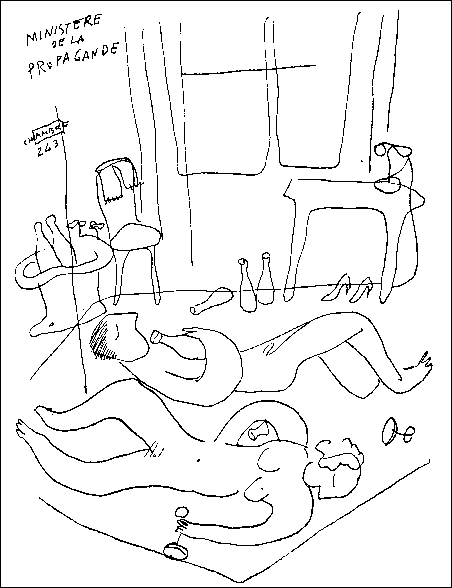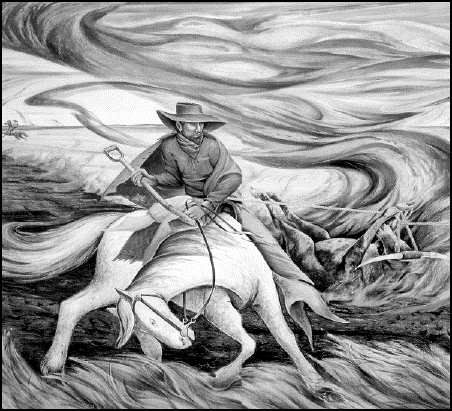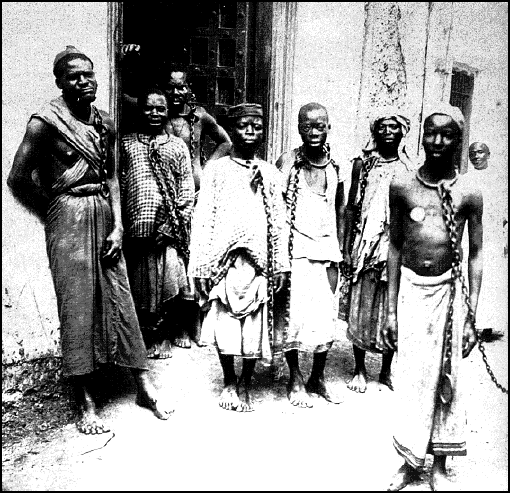(As Reviewed in Our Salad Days)
- We receive hundreds of novels each year
and try to review as many of them as possible.
Here are a dozen from the Salad Days of RALPH,
those days referred to in the I Ching as "Youthful Folly."
These books are ones that we think deserve
your consideration if not your affection.
To read the whole review,
click on the title.

- I had never tasted such snails; fat, tender and of marvellous flavour, they were swimming in a sauce of browned butter, parsley and garlic.
He asks Schooner how he ever found such a place: "The thing to watch out for in a restaurant is a head-waiter or a maître d'; as soon as you see one, turn round and walk out. Also, beware of chafing-dishes."
- I've found that three good signs are a small menu, darned tablecloths, and an old dog on the premises.
Later, Glassco will go off, stop for a brandy and find one of his new friends and who has recently been thinking about the couplets of Cocteau, "Le nègre, dont brille des dents
Est noir dehors, rose dedans," which immediately puts Glassco in mind of Marvell,
- Had he lived longer, he would have been
Lilies without, roses within...
In two years, the writer lives through twenty years worth of food, love, art-talk, parties, meeting the greats ... and prostitution (he works in a male bordello for a while). And walking, always walking, dazed by the glory that is Paris.
The singers: the redbreast, mistle thrush, nightingale, black-cap, titlark, stone curlew, chiffchaff, bullfinch, snipe; the echo of their song, the hills and valleys filled with music the live-long day and much of the night. All this rustic melody of countryside haunts the reader, makes us wish to teletransport ourselves back 250 years --- no jets, no jack-hammers, no car-alarms, no stereos, no freeways, no horns, no sirens, no screeching of brakes, no banging of dump-trucks, no whining of tractors, no jarring of our days. Only a rural harmony, with its words that come to us from so far back in our heritage --- the ha-ha (a type of fence), huckaback (fabric), Marvel of Peru, pinchbeck (fake gold) smock-frock, stickleback, straddle-bob (Orion), lop and top (timber), dimity, flitch (bacon).

What did you say? A fine writer ending up as head of the sixth largest country in the world? Can you ever ever picture the President of the United States being revealed to have written a lusty funny tale of fishermen and monsters and passion, the story of a man with a wife who at the end of the forty years with him can say,
-
Let's forget about time Cristório. It doesn't exist here and still we count it. Let's get rid of days and nights, months and years and leave everything as though it was only Sun and Moon. Time's something people get into their heads. They invent it.
Could you and I ever never ever dream of having a president who could write like that, tell us that time is something people have just made up? Or that "He'd never thought that a woman would be able to have that taste and sweet smell, something that wasn't just possession but a feeling of vastness?"
Wouldn't having the leader of our ship of state ... having someone running the whole comic state of politics being one who could write like that? Wouldn't it make us all deliriously, madly happy?

Now he has closed in on the "wean" (the kidnapped waif) and at the moment of truth, his foot gets jammed in a bloody cowcatcher, taking several minutes --- which seem like hours to us --- to get his prosthetic device out from between the bars so he can start shooting again.
Thus a typical day in the life of a former goon of the Irish-American mafia, a former member of the WPP (the witness protection program), a man with several scores of hoodlums, screws, gunmen, toughs, IRA members, "peelers" ... and the head of a local goon-squad ... out to stop him or, better, "top" him.
During the 1968 uprising of students at the University of Mexico City, she spent thirteen days hiding in the bathroom of the Faculty of Philosophy and Literature building where she wrote her poetry, which she then ate. Once she saw death coming for her, on the streets of the city,
-
I put my hand into my handbag, I mean my satchel from Oaxaca, and felt for my knife, which I always carried with me, as a precaution against urban emergencies, but the burning skin of my fingertips could feel only papers and books and magazines and even clean underwear (washed by hand, without soap) ... but the knife, ah, my friends, now there's another recurring and terribly Latin American nightmare: being unable to find your weapon; you know where you put it, but it's not there.
 "For the rest of her life when she closes her eyes, she finds only three images of all the thousand she intended to keep: a line of low purple flowers, sparse and underfed, sprinkled among the fallen trees; green light rippling noisily across the night sky; a pink coral-streaked dawn near Tagish."
"For the rest of her life when she closes her eyes, she finds only three images of all the thousand she intended to keep: a line of low purple flowers, sparse and underfed, sprinkled among the fallen trees; green light rippling noisily across the night sky; a pink coral-streaked dawn near Tagish."The purple flowers of the Alaskan wild, sparse and underfed.
We first found Away in a HighBridge audio edition narrated by Barbara Rosenblatt. I can't tell you how much fun it was, day after day --- I only get to hear it on the commute --- listening to Lillian's exuberant high adventure in a nearly perfect rendering. The men sound like men, the women like women, and, meanwhile, there are the perfect intonations of 1920s Brooklyn Yiddish life, including Yaakov Shimmelman ("Tailor, Actor, Playwright ... Pants pressed and altered").
When she laughs at his calling-card, he admonishes her, then says, "I was just teasing you, ketzele. Of course it's funny. It's true, it's absolutely tragic --- and, he adds, in English, 'abso-tive-ly, pos-a-lootly' --- but that does not make it any less funny. For people, like us,"
- and he looks at her closely, to see if she is people like him, and he seems satisfied, "that makes it even a little bit funnier."
One critic called Away a "Moll Flanders on-the-road novel," but it's more interesting than Defoe (or even Kerouac). Bloom is a first-rate story-teller, so good that you don't want her to get on with it, even when, at last, Lillian finds (and almost loses) the love of her (and our) life.
Walking the streets of Prague, long after the fall of Soviet Russia, memories of friends who became members of the SS, KGB, or (worst of all, for those living in that part of the world) the much-dreaded Ustashi. A day spent on the streets, going in and out of taverns, the 71-year-old Ivan, the 44-year-old Honzo, and their thoughts, fears, delights, delusions, loves ... and their strange Czech drinks: "Magic Eye," "V-2 Rocket," "Pond Scum," "Chumbawamba," "Bamboo Shoot with a Motor" which is, gag, "Red wine and cola, half-and-half, with a large shot of Fernet, an atrocious drink."
In the course of our stroll through the late August streets, we slowly come to know Ivan and Honza Benes [a carat over the "s" --- my keyboard doesn't make it], he a scientist, grew up rich, spent it all, now living in a "bedsit, in Prague-Sporilov,"
-
The rotten wardrobe, the mouldy bathroom, the cheap mass-produced furniture, the rows of dusty bottles amongst the piles of grime beneath the kitchen sink.

Time, and growing up, and chance, the odd odds that play such a role in our lives: Trond, hidden, watching his father disappear up the hill, hand-in-hand with a woman who is not his mother; disappearing, as fathers must disappear, into or out of space, or time, or disillusionment ... his father vanished with another mother, a mother of three, one with the odd name of Odd, who, at age ten, is accidentally shot to death by his twin brother, Lars ...
... the same Lars from 1947, who lives down the hill from Trond in 1999, there in east Norway, just above the river and the Swedish border, there just before the millennium.
Out Stealing Horses is timeless, good, filled with wonder; too good, by far, to be put down easily --- or easily forgotten.
Forrest Gander? Did he make up that name? By page 7 you can't tear me away. By page 20 I am thinking where did he come from (Mars? Venus?) And by page 50 I am thinking there are writers and there are writers and this guy takes the cake. How do these novelists do it?
Dylan Thomas said it was all a matter of "a craft and sullen art." It sure as hell is not something they teach you in school. Don't ask me. I tried.

His trips to the Middle East consistently make him sick, damn near kill him, certainly plunge him into despair. And I'm thinking that if I had to live with, deal with, answer to those who made up American policy in Iraq over the last few years, I'd feel pretty ill meself.
Depressive or no, Earle has conjured up a real-life tale that is a potent mix of political and war-zone terror, with an edgy plot, honest despair, exotic heroes, unlikely villains, surprising bores (John McCain, Hilary Clinton among them) ... interwoven with a style almost as good as that of the master mystery writers. As Earle is descending into Baghdad in a "flying truck,"
- Again and again, we were given the message that serving in Iraq as diplomats would be a long step beyond hazard and danger. We made out wills. We provided blood samples that would facilitate DNA identification of our remains. We listened to a woman describing how she'd had much of her upper arm blown off, and we'd had a look at the gnarled results.
Helmer's twin brother Henk died in a car wreck when they were nineteen. Helmer says of his brother, "Henk was the farmer. Henk was Father's son."
- What he was supposed to make of me or what I was supposed to make of myself were questions he could ignore.
What the reader is supposed to make of Helmer is an open question as well. The tale opens when Helmer moves his father upstairs. The old man can no longer walk, cannot even get to the bathroom by himself, so he puts him upstairs where there are no accommodations.
He offers him a little to eat every now and then. An apple, a bit of cheese. The title in Dutch, Boven is het stil is, as one critic suggested, quite sinister: "It's quiet upstairs."
Forty years after the fact, the woman who killed his twin calls, asks Helmer if he can take care of her son, also named Henk. Henk II is your typical feckless juvenile: he wants to spend the morning in bed, the afternoon in the kitchen eating, and all night watching television. Like all juveniles, Henk II is a champion pouter. Helmer takes him on.

-
Oh the mustiphino's child with a white man for a papa will find each day greets them no longer with a frown, but welcomes them with a smile, as they at last stride within this world as a cherished white person.
It's a tricky world Levy is offering so artfully. It's a world of miscegenation, whippings, and hidden passion ... littered with dialogue that, I suspect, would not have been permitted two decades ago. In one scene, Goodwin seeks to have his field hands punished for not working hard enough to suit him --- mostly, because, after they've been freed, they are no longer willing to work as slaves. The Falmouth townspeople whom he hires to terrorize the blacks think of him, as the author suggests, as "Not long out from England ... still a bit green ... his dad's a parson back home ... believes we should be nice to niggers."
Ms. Levy knows how to polish the words and knows (well) the history of Jamaica of two centuries past. It was a place of musical speech and sugar cane and heat and absurd poverty of the blacks and absurd freedom for their Church of England masters. Ms. Levy writes all this with such a delicate irony that one might, like me, be unwilling to part with the book for even a moment before getting to the end.

I guess if you are going to be floating naked ghosts up and down and around the story, in this case, the seventh story of a condo, you must ground them all, somehow. After all, these wandering spooks do provide us with a merry contrast (and they are merry as they meander through walls and ceilings) ... very merry compared to the stiff-necked condominium owners.
It's a story grounded in reality: ham and melon, in-laws, drunks, neutron bombs there in a not-yet-quite-finished condominium building; but, too, it is a ghost story, told in a ghost building (no one lives there yet). It's New Year's Eve: "The union of the year and the moment was like the ownership of the building."
-
Each owner possessed a floor, a garage and a box room, but nothing else: that was all they could sell. And yet at the same time, they owned the whole building. That's how a condominium works.
He's right: in a condo, you own nothing but a tiny hunk of the ground and several square meters of space above. It's a real spooker, it is.